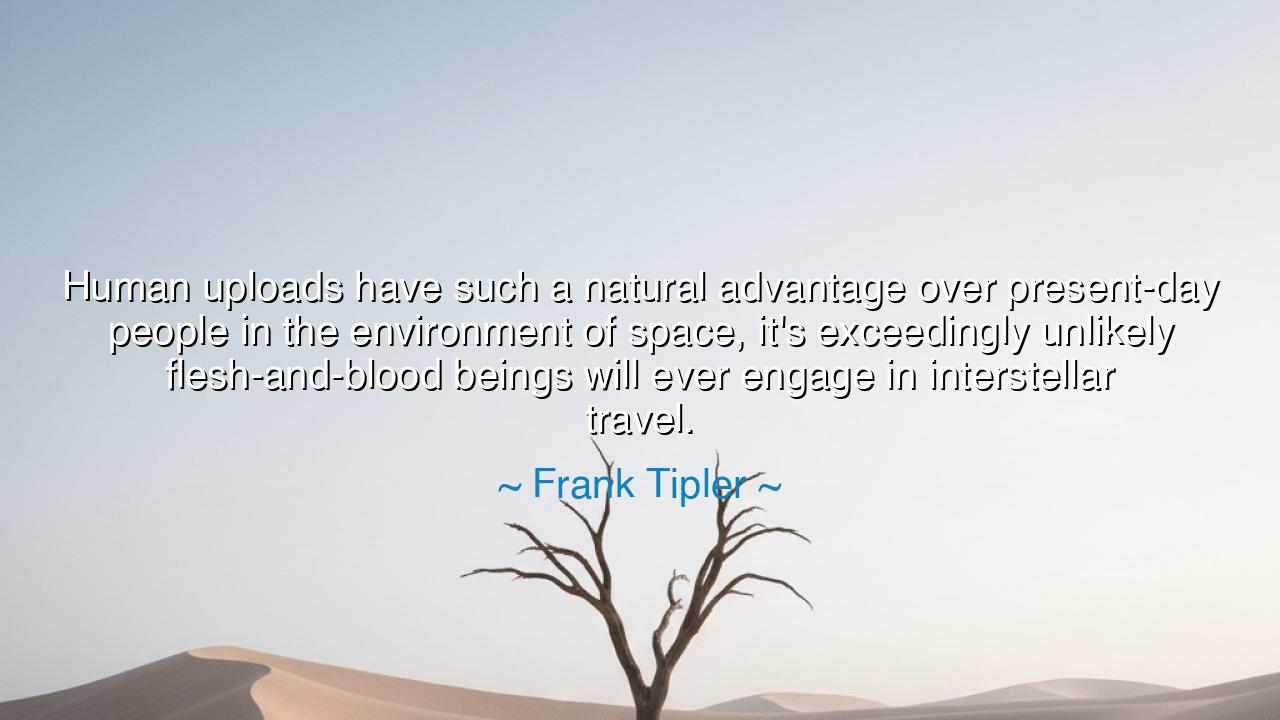
Human uploads have such a natural advantage over present-day
Human uploads have such a natural advantage over present-day people in the environment of space, it's exceedingly unlikely flesh-and-blood beings will ever engage in interstellar travel.






"Human uploads have such a natural advantage over present-day people in the environment of space, it's exceedingly unlikely flesh-and-blood beings will ever engage in interstellar travel." Thus speaks Frank Tipler, and in his words we hear both the sorrow and the triumph of our age. For he declares that the body, fragile as clay, bound by hunger, thirst, and breath, is not destined to wander the stars. Instead, it is the mind, freed from the burdens of flesh, that may pierce the silence between worlds. His vision is bold, unsettling, and filled with the fire of prophecy: man will not walk among the stars as flesh, but as spirit clothed in circuits, light, and thought.
The ancients too longed for this release. Plato dreamed of the soul, unshackled from the body, ascending to the realm of perfect forms. The mystics of every faith spoke of shedding the mortal coil to enter eternity. Tipler, in his scientific tongue, tells the same tale—that the frailty of the flesh-and-blood being cannot endure the void. To sail the seas of the cosmos, we must transform. We must become as light itself, as enduring as code, as patient as machines. This is not an escape, but an evolution, a continuation of mankind’s eternal quest to transcend limitation.
Think of the explorers of old, who set out across oceans in wooden ships, their bodies broken by scurvy, storms, and starvation. Many perished, yet their voyages unveiled new worlds. Imagine if they had been freed of their hunger, their need for air, their fear of drowning. Such is the promise Tipler reveals: that as human uploads, explorers would voyage between stars without fear of death or decay, enduring centuries where the body would perish in days. The journey that destroys the flesh may yet be sustained by the mind reborn in light.
Consider too the cosmonauts and astronauts of our own time, bound within their fragile vessels, carrying with them air, food, and water like prisoners dragging chains. Every mission is a struggle against the body’s need to remain tethered to Earth. How vast a difference it would make if consciousness itself could travel, unbound by such weight! Just as fire once freed men from darkness, and ships once freed men from shores, so too might the liberation of mind from body free us from the cage of Earth.
Yet let us not be blinded by the splendor of this vision. For while the promise of interstellar travel may belong to the uploaded mind, we who live as flesh must still find meaning here. The lesson of Tipler is not only about distant stars, but about the eternal struggle between limitation and transcendence. It is the nature of mankind to reach beyond itself, to fashion tools that magnify strength, to invent vessels that expand horizons. The body has always been frail, yet the spirit has always found ways to overcome.
Children of tomorrow, hear this wisdom: do not despair that the body cannot reach the stars. Instead, rejoice that the human spirit finds ways beyond flesh. Whether in science, art, or faith, seek always to transcend your chains. Use the body well, but do not be bound by it. Just as writing outlives the hand, and music outlives the breath, so too may the essence of man outlive the clay.
Practical action lies before you: cultivate your mind, for it is the truest vessel. Nurture wisdom, creativity, and compassion, for these are the cargo that may one day travel where bodies cannot. Live with vision, not only for the span of your days, but for the generations to come. Perhaps you will not see the stars as a traveler, but your spirit—your thoughts, your creations—may yet walk among them, carried as human uploads across the heavens.
Thus the lesson endures: the body is dust, but the mind is fire. The flesh may falter, but the dream persists. If we would journey to the stars, we must learn to shed our weight and rise as thought itself. And when that day comes, mankind will no longer merely gaze at the constellations—he will dwell among them, not as mortal flesh, but as eternal spirit clothed in light.






AAdministratorAdministrator
Welcome, honored guests. Please leave a comment, we will respond soon